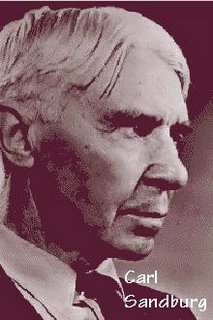
The terraced rice fields of Bali. Worth a deko.


Carl Sandburg 1878-1967
Here’s some poetry from a favourite poet – Carl Sandburg. I first came across Sandburg’s poetry at an Americal Literature class, and I was immediately struck by the sheer simplicity and force of his words. His words strike at you – there is no holding back here. There is passion, strength of emotion and a bold and distinct point of view that looks at the underdog as the real hero. He is obviously a working class poet – a socialist, who wrote about the common man and woman, everyday struggles, loves and joys. His most famous poem is of course,
I ASKED the professors who teach the meaning of life to tell
me what is happiness.
And I went to famous executives who boss the work of
thousands of men.
They all shook their heads and gave me a smile as though
I was trying to fool with them
And then one Sunday afternoon I wandered out along
the Desplaines river
And I saw a crowd of Hungarians under the trees with
their women and children and a keg of beer and an
accordion.
EVERYBODY loved Chick Lorimer in our town.
Far off
Everybody loved her.
So we all love a wild girl keeping a hold
On a dream she wants.
Nobody knows now where Chick Lorimer went.
Nobody knows why she packed her trunk. . a few
old things
And is gone,
Gone with her little chin
Thrust ahead of her
And her soft hair blowing careless
From under a wide hat,
Dancer, singer, a laughing passionate lover.
Were there ten men or a hundred hunting Chick?
Were there five men or fifty with aching hearts?
Everybody loved Chick Lorimer.
Nobody knows where she's gone.
Now the stone house on the lake front is finished and the
workmen are beginning the fence.
The palings are made of iron bars with steel points that
can stab the life out of any man who falls on them.
As a fence, it is a masterpiece, and will shut off the rabble
and all vagabonds and hungry men and all wandering
children looking for a place to play.
Passing through the bars and over the steel points will go
nothing except Death and the Rain and To-morrow.
HOG Butcher for the World,
Tool Maker, Stacker of Wheat,
Player with Railroads and the Nation's Freight Handler;
Stormy, husky, brawling,
City of the Big Shoulders:
They tell me you are wicked and I believe them, for I
have seen your painted women under the gas lamps
luring the farm boys.
And they tell me you are crooked and I answer: Yes, it
is true I have seen the gunman kill and go free to
kill again.
And they tell me you are brutal and my reply is: On the
faces of women and children I have seen the marks
of wanton hunger.
And having answered so I turn once more to those who
sneer at this my city, and I give them back the sneer
and say to them:
Come and show me another city with lifted head singing
so proud to be alive and coarse and strong and cunning.
Flinging magnetic curses amid the toil of piling job on
job, here is a tall bold slugger set vivid against the
little soft cities;
Fierce as a dog with tongue lapping for action, cunning
as a savage pitted against the wilderness,
Bareheaded,
Shoveling,
Wrecking,
Planning,
Building, breaking, rebuilding,
Under the smoke, dust all over his mouth, laughing with
white teeth,
Under the terrible burden of destiny laughing as a young
man laughs,
Laughing even as an ignorant fighter laughs who has
never lost a battle,
Bragging and laughing that under his wrist is the pulse.
and under his ribs the heart of the people,
Laughing!
Laughing the stormy, husky, brawling laughter of
Youth, half-naked, sweating, proud to be Hog
Butcher, Tool Maker, Stacker of Wheat, Player with
Railroads and Freight Handler to the Nation.
Never Let Me Go
Kazuo Ishiguro is a writer I like. His prose is spare and minimalist yet manages to imbue drama in the plot almost effortlessly. Never Let Me Go is one of his most recent novels and like Remains of the Day, one of my personal favourites, it takes you into the mind of the narrator and leads you through the days of her life, without fuss, without melodrama.
The narrator is Kathy H. No surname, no one in the book has one and no explanation as to why it is so. Her narration is simple and seemingly normal – about her memories of her old school Hailsham and her 2 closest friends Ruth and Tommy. Except for stray words like ‘carer’, ‘donations’ and a complete lack of any reference to family, there is nothing unusual in a woman’s memories of a boarding school – the usual bullying of weaker classmates, the mindless cruelty only children are capable of and the fierce inexplicable loyalties between friends. Yet slowly, the reader begins to become aware of unusualness. You start to realize that this is no ordinary school. And the students are not your normal teenagers. The students themselves seem aware at some level of their own ‘differentness’ but as the novel unfolds, their awareness grows with that of the reader. And soon the reader begins to grasp that there is something quite horrific going on. That this is a world where humans are cloned with the express purpose of donating healthy organs to the rest of the world. And that Hailsham is a place that tries an experiment – trying to give these clones a semblance of a normal human life by burying some of the reality, blurring the truth a bit. And the central debate of the book is revealed as it moves along – is hiding reality from these children really a form of cruelty? Is it really kindness or pity that drives the founders of the school? Kathy and Tommy at the end decide that it would have been better to know. That it always is better to face the entire truth, that ignorance in the long term is not bliss.
It is quite a strange plot, not a normal everyday one. But it drags you along, curious about the triangle of Kathy, Tommy and Ruth. The juxtaposition of the normal love triangle in the bizarre, almost science-fiction-like setting is quite riveting. And Kazuo Ishiguro once more has a winner on his hands.
Rang De Basanti
But I liked the film, nonetheless. It tackles issues that I haven’t seen in any Hindi film before – the scandal of the MIG21 crashes and the ghetto-isation of Muslim communities are 2 that come immediately to mind. It does this but does not forget to entertain, unlike a Swades. All in all, it’s a good tale and quite well told.
I read a book like this and I want to go back to school. The ideas, the people, the history! We often think of existentialism as something...
